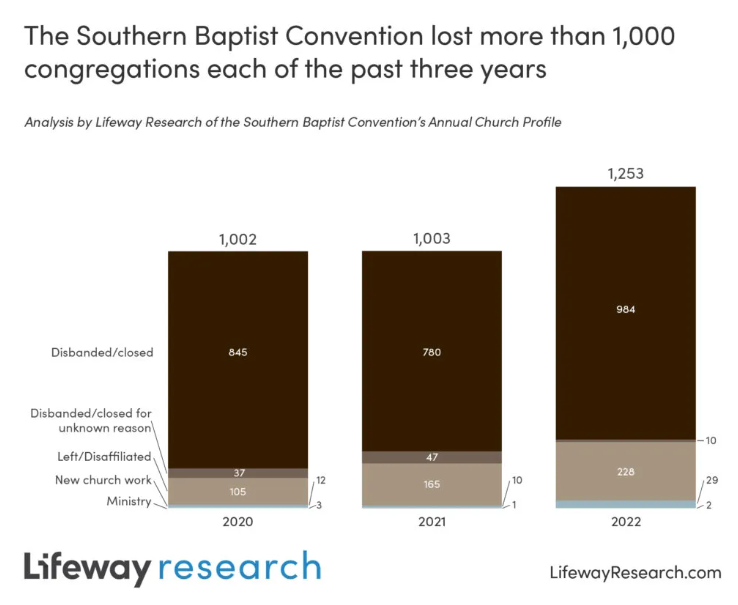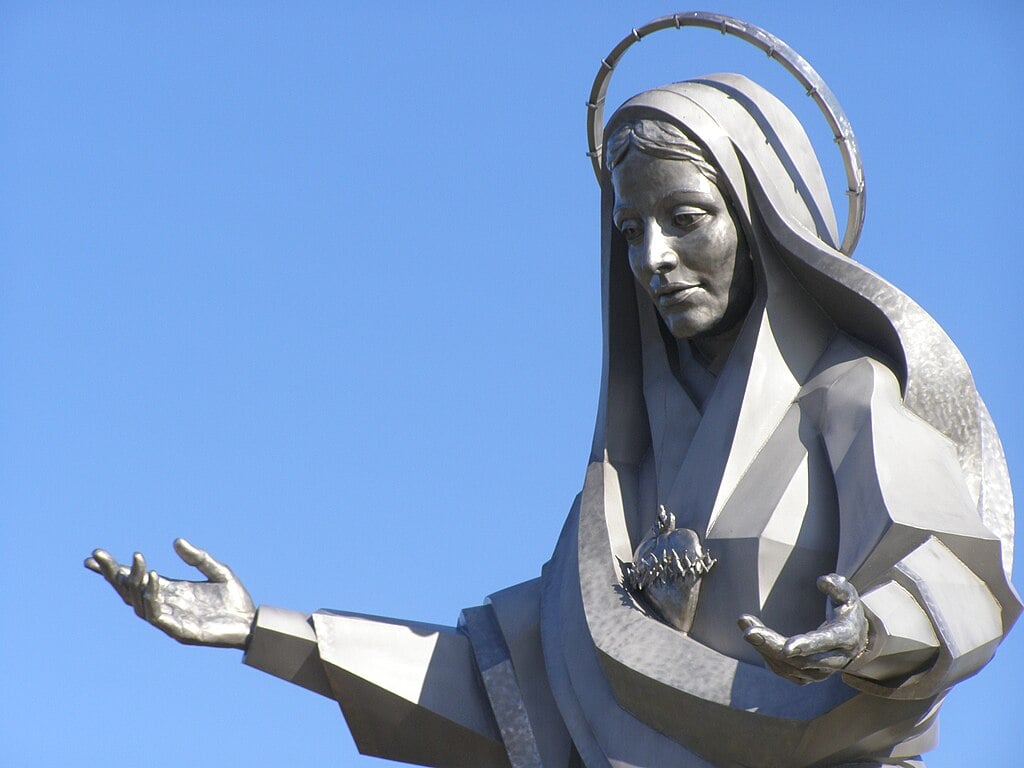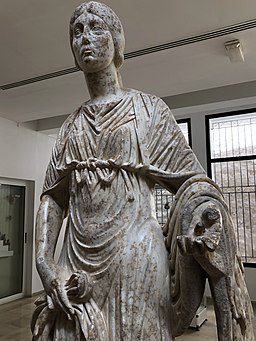In June 2023, Southern Baptists gathered in New Orleans. They voted their collective opinion on what they think of women in the pulpit. Essentially, cleaning it or only gracing it for announcements is welcome.
The unwelcome part sparked national news, scathing headlines, and a small exodus of major churches formerly members of the Southern Baptist Convention. The first church slamming the door behind it is one of the largest churches in the country, Saddleback Church. And the man addressing the SBC was the influential pastor and best-selling author of “The Purpose Driven Life,” Rick Warren.
Warren demanded the Southern Baptists on the SBC board reconsider expelling his church. The problem is that he has a campus pastor at its flagship Lake Forest location, Katie Edwards. Although an all-male elder board leads the church, Saddleback didn’t see a problem with having Edwards succeed its retired pastor, Andy Wood (no relation).
Not for nothing, but Wood and his wife Stacie, who is still a teaching pastor on staff, succeeded the retired Warren.
The New York Times reported that Warren appealed to the representatives to “act like Southern Baptists who have historically ‘agreed to disagree’ on dozens of doctrines to share a common mission.” The plea fell on a two-thirds majority of deaf ears as 9,437 votes upheld the decision, compared to 1,212 against.
 Since then, the SBC has lost several prominent names, including Elevation Church and its founder, Steven Furtick, and nationally regarded Bible study teacher Beth Moore.
Since then, the SBC has lost several prominent names, including Elevation Church and its founder, Steven Furtick, and nationally regarded Bible study teacher Beth Moore.
That was 2023, not 1923.
You know? When women were sick and tired of being treated as property who had no voice, no acumen, no insight, and only one job–raise the family. It was the 1920s that began with the Women’s Suffrage movement. Stalwarts like Susan B. Anthony, Elizabeth Cady Stanton, Alice Paul, and Carrie Chapman Catt fought for recognition and repeal of the “barefoot and pregnant” label.
On August 26, 1920, the 19th Amendment to the U.S. Constitution gave women the voice to vote and contribute to society. Since that day, women have shattered their glass ceiling, and a few have even run for president. Today, women can run a family, a business, a corporation, and even help lead a country. Yet, according to many powerful Southern Baptists and other theologians, there is no skylight over a church.
Why?! Some reasons may surprise you.
Before we delve into those questions, do you want to stay in touch with the faith-based issues that hit close to home? Subscribe to our free newsletter and never miss what’s being said about the Church and what Christians can say back.
Women in the Bible

Among the estimated 3,400 names in the Bible, 170 are women, and five are in Jesus’ genealogy. Women were essential to most men’s journeys and ministries listed in those 66 books. There’s an aphorism that says, “Behind every good man is a great woman.” (Fun fact: Although that saying is considered anonymous, the source is thought to be Meryll Frost, captain and quarterback for the 1945 Dartmouth University football team.)
The Bible certainly proves that. Mary inspired Jesus, as did Mary Magdalene. Elizabeth inspired John the Baptist in a similar fashion. Moses’ sister Miriam was a motivator. Sarah is known for laughing but was also a source of strength for Abraham. Few people have the faith of Hannah or her son, Samuel the prophet. Esther risked her life to save the Jewish people and ended up marrying a king. Huldah was a prophetess, and Deborah was a judge. All are pioneers of the Christian faith. Each has a tremendous story preached in churches around the world. They all led people of God in one form or another.

And then, there’s Priscilla, noted in Acts 18.
In AD 49, Emperor Claudius expelled all Jews from Rome for their civic activism for religious freedom. Two of those people were Priscilla and her husband Aquila. They went to Corinth and opened up a tentmaking shop (Acts 18:1-4). While that was their profession, it would not be their purpose. They met a new firebrand of evangelism named Paul, who stayed with them during his travels. That relationship helped Paul understand who they were and what they could do in service for the Lord.
He appointed Aquila and Priscilla over the church in Ephesus. Period.
She understood leadership and the countryside. Priscilla was a Roman by birth and a Jew by choice when she married Aquila. Her conversion to Christianity from Judaism was also a choice. No doubt Paul admired that about her. Priscilla understood what it meant to believe in Jesus, and how to communicate His love to Jews and Gentiles alike. That’s why she was partly in charge of the structure, needs, and, yes, even teaching the people. To some, that makes her the first female pastor in Biblical history. Some theologians believed she even contributed to writing the nameless Book of Hebrews.
Throughout history, inside and outside of the Bible, women have led masses, missions, and movements. They have taken great strides and performed admirably under pressure. Women can lead Bible studies, like Joni Eareckson Tada or Beth Moore. They can pack large facilities or stadiums to hear God’s Word, like Kathryn Kuhlman or Aimee Semple McPherson. Women can lead monumental ministries like Joyce Meyer, Christine Caine, Marilyn Hickey, or Priscilla Shirer.
Some women have even been known to pastor a church, like Paula White, Juanita Bynum, or Bernice King (and I dare anyone to tell her she didn’t have a good role model for leading people of God).
But women can’t fulfill the role of a pastor and lead a church? Why is that again?
Navigating Those Southern Baptist Waters

When you study religion in any context, you quickly come across many “-isms” to explain theological ideology. These distinctive practices can illustrate the breadth of humanity’s journey to find faith. We are talking about heavily debated topics such as:
- Cessationism — The thought that charismatic gifts (i.e., healing, prophecy, speaking in tongues) were only necessary to usher in the Church during Biblical days.
- Dispensationalism — The belief that God’s promises to the children of Israel do not transfer to the new covenant Church of today.
- Evangelism — The spreading of the Gospel message through public speaking, professional reputation, or public sharing.
- Legalism — An idea that good works aren’t just evidence of salvation but that works, in conjunction with faith, actually save someone from eternal damnation.
- Universalism — Heretical thought that promotes all of mankind will abide in heaven, even after a temporary stay in hell.
Another is egalitarianism, which is the belief that both males and females are unfettered to fulfill all roles in the church and the home. In terms of Southern Baptists and the shunning of women pastors, egalitarianism is “woke.” As with anything these days flirting with the idea of a “woke” or progressive view, the conversation is diluted into pros and cons; black or white, with no shades of gray.
Pros
- God told Adam and Eve, “Let us make mankind in our image.” Eve had a serious place at the table and an opinion that mattered.
- Gender has never been a factor in the Holy Spirit bestowing gifts on God’s children.
- In the Bible, women have been teachers (1 Timothy 2), evangelists (John 20:17), prophets (Galatians 3:26-29), and apostles (Romans 16:7). That’s four of the five callings in the ministry, so why wouldn’t there be a female pastor?
- Women were not considered as subordinates until Adam and Eve fell from grace (Genesis 3:16)
Cons
- Adam was held responsible for the sin of Eve (Romans 5:10-15)
- Paul suggested in 1 Timothy 2 that women should not “exercise authority” over men
- Jesus didn’t call a female disciple, despite how God used Mary, Elizabeth, and Mary Magdalene
- In Titus 1:6, we read that a pastor should be male
Deductive reasoning suggests there are strong reasons to consider either side of this discussion. And any time in the Bible where there isn’t a clear line of demarcation, it’s time to keep asking God. Maybe there is implicit meaning in the words?
In Greek, the word is “poimen.” In the bible, that word is only once as a noun, implying a “church officer” (Ephesians 4:11). Every other time in the Bible, pastor is a verb as “one who serves as a shepherd or guardian.” “Pastor” comes from the 14th century in France. It means “spiritual guide, shepherd of souls, a Christian minister or clergyman.” Much like shepherds lead and corral sheep for their safety, Jesus does the same for us and compares us to sheep 220 times in the Bible.
These days, women are being ostracized for being a noun and applauded for the actions of the verb. Same word. Different gender. One conflicting paradox.
Let a woman learn in quietness in all subjection; but I do not suffer a woman to teach nor to exercise authority over man, but to be in quietness…
If you ask Southern Baptists, Paul, Jesus, or anyone else for that matter, cared that women were not at the helm of any movement. If you look at some of the notes written above, you may think this newfangled egalitarianism is a real thing and just maybe women could do that job. Even the uber-Orthodox can admit while the Holy Spirit impressed on Paul that women should not hold a single office, He did not specify a woman’s place in ministry at all.
“Well, well. Eve was made after Adam, so isn’t that clear?”
“It could be clear, but then again, God made the duck-billed platypus before He made men. So, there’s that.”














